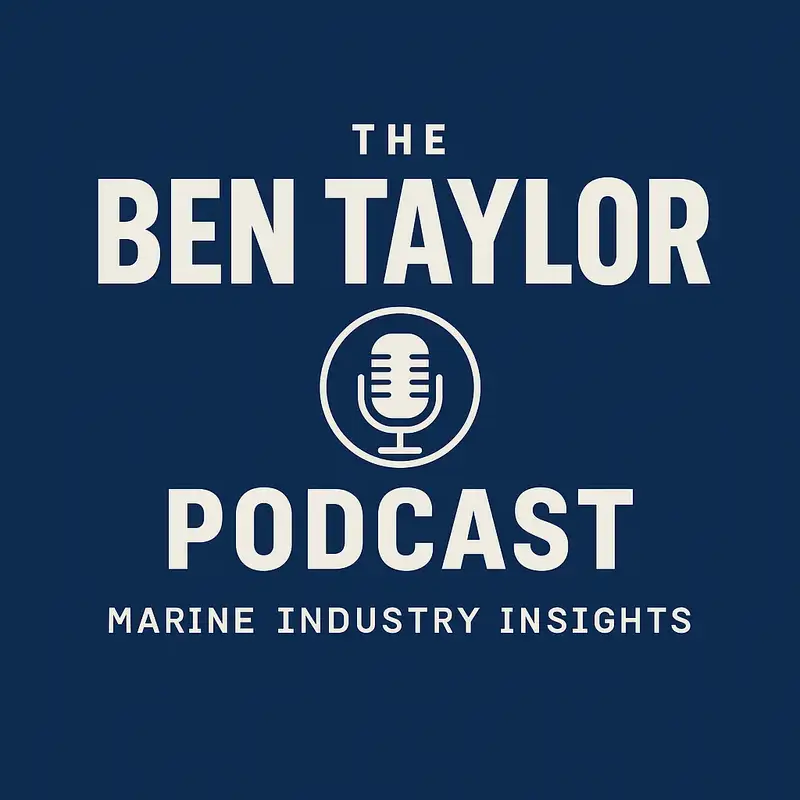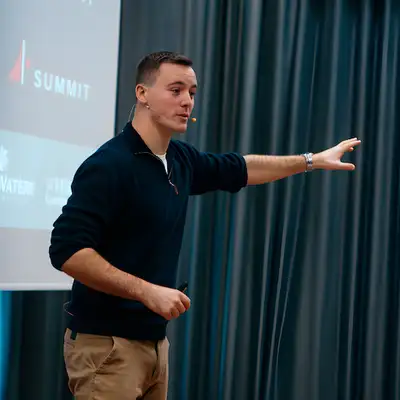
The Future of Superyacht Power
You have the possibility to use different power source, not only combustion, but also tomorrow, maybe with a hybrid solution, electric engines, or maybe... This is the Ben Taylor podcast, the home of Marine Industry Insights. Enjoy! Hey everybody, welcome back to another episode of the Ben Taylor podcast, the home of Marine Industry Insights. With this episode, we're doing part of a series to profile the Australian yachting industry, and so we're sitting down with a few key stakeholders here. So I'm here with Nicola, nice to see you Nicola. It's a pleasure to be here. So let's have some context. Volvo Penta, what's your interest in this market, what's your position, why are you here? Volvo Penta is, of course, our mission, our vision is to be a leader in sustainable power solution. And now we have a pleasure to be here in ASMEX today to present, to introduce the IPS Professional Platinum, which is the biggest IPS, so the system that allows us to enter into the super yacht league, let's say. Not only for super yachts, but also for big marine commercial vessels. Yeah, I think I saw this back in September, the Monaco Yacht Show. And so what's so special about the system, why is it so interesting for the Australian market in particular? I mean, for us, we put in focus, also you see the events in Monaco, when we present to the world a new platform, the IPS Professional Platform, and our aim is to enter in the, as I said, in the super yachts, in the super yacht league. For us, Australia plays a super role, super important role in that respect, because for us it's important for two sides. As a receiving market, and you are growing a lot in terms of infrastructure, and also as a bottle painter, we try to follow this infrastructure as well, with our infrastructure in order to serve our system around the specific place here in Australia. But also when it comes to builder, you have also your builder, manufacturer, your shipyard, they are building big boats, big yachts, but also ferries for marine commercial. We would like to be there with our system, we would like to follow you, but also you are important also for designer. We have a very high, big community of designers also here in Australia. I suppose it's a long process, isn't it? It sounds alright building a boat or refitting a boat, the proportion isn't just refit overnight. There's a lot of design work, it's quite a long process, and then a new solution like this also needs a bit of, I suppose, education in the market, saying this is available, why don't you consider this during the design phase to realistically be an installed solution at the end of the day. You touch a very important point. When we start to design the IPS Professional Platform, we understand immediately that we need to be in touch with different stakeholders. Designer is definitely one of those, not only designer, but also we have captain, surveyor, brokers. But when it comes to designer, of course, they are playing a super crucial role when it comes to the introduction of the system, not just because of the fact that they have the possibility to have much more space on board, because this system is much more compact compared to the traditional one, but also because it's important for the naval architect as well. To design the most efficient out, to have the best performance in the super yacht, in the boat. Designer play definitively a crucial role in the introduction of the system in the segment. So how do you work with them? What's that process look like? Do you get the designers over to Italy to display it and get them on test runs? Is it like a whole bunch of diagrams? Normally we used to have, we'd be in touch with the designer. We organize during the year different events when we present the system. We invite also designers in Sweden, in Krosolman, where we have our test center, in order to show how do we work with the designer. But also it's fantastic because we really managed to engage them, to give their ideas as well, and also to try to create some sort of, you know, collaboration in the new projects. Also, when we discuss with them, we immediately realize, they realize immediately that they have the possibility to design the boat in a different way. Why they start to design really the boat around the system. And then by doing this, they get a lot of benefit in terms of, as I said, space on board. But as I said before, also efficiency. Take into account that also Volvo Penta, we are responsible for the full driveline, not for props to helm. And also we give to the ship that's also the performance prediction of the boats. If we, I mean, according to the displacement we have, the speed that they want to have, according to the use profile, we can give the full performance prediction. Yeah, and so in the research and development phase, how do you go about finding out what are the key pain points? What's going to really serve this market well? How do you research that? Yeah, that's before starting to build this IPS professional platform, we start, I mean, the IPS professional platform is really a result of years of collaboration and dedication, talking with all the stakeholders in order to get all the feedback from the designer, from the captain, from brokers, in order to be sure that we put into the market something really, really efficient. And then we start to design the system according to the feedback that we get. But it's not enough, this. We, in any hour, even if we have defined the system, we have realized the system and we start to deliver it to the market, we still, we keep open this dialogue. And it continues on. It's not just kind of launch, right? Then we designed it. Exactly. That's great. For instance, we have organized several, you know, captain event in Krosolman in Sweden. And also we have continuous dialogue with designer in order to try to refine every time, you know, the system in order to make sure that you have the best, the state of the art of the professional system. And so you've touched on it already, but in terms of the strategy to market, what kind of relationships do you create? Is it always directly with shipyards, just refit OEMs? Do you have different distribution partners, corporate presence? How does it work? Our traditional channel is, of course, OEM and dealer. Of course, if you look into our, say, product portfolio, we normally used to distribute our product through these two channels. But when it comes to the big system and the super yacht, we need to, we have to start, as I said before, to a little bit to have a wider, you know, stakeholders. Different networks. It's a really nuanced buying process. Like it's really oddball. Exactly. And then we realized immediately, as I said, we need to talk with different stakeholders, which is those that are maybe not, they were not in our radar before. And now we start really to target those relationships. And also it's part of the strategy to be here also in Asmex, not to stop with all the stakeholders, with this fantastic audience, in order to start to create a new relationship, networking, in order to show up to the world that we are part of this. And so what's, no, no, that's really good. And what's the vision looking forward? Are you particularly optimistic about this market? Yes. How do you see in terms of the potential? For us, it's, I mean, I think it's yachts, super yachts, but also marine commercial, professional vessels are definitively one of the, let's say, if you look into the, our market is a much more stable market, somehow, even if we are talking about smaller units, smaller, yes, volume, of course. But I mean, that's for sure. It's a market that we would like to be, but also we would like to be there, not just only with another professional system, but something really revolutionary, something that really is a game changer. Yeah, it fits the market really well. Exactly. And then it's one of the characteristics of our system is also the flexibility. You have the possibility to use different power source, not only combustion, but also tomorrow, maybe with a hybrid solution, electric engines, or maybe with also alternative fuel as well. Right, so even though you understand the trends and what's likely to be the situation, if it changes, then you actually can adopt and adjust accordingly. We would like to create a system that is with a high versatility and also has to be flexible because we don't know what will be the next trend in the future, what will be the new technology coming in, but we need to be prepared. Okay, super. Thank you so much for your insights, Nicolas. It was a pleasure to meet you. Thank you very much. Thank you very much. Everybody, I hope you found that insightful. All being well, we'll see you again very, very soon. Make sure you're following along here to see plenty more content like this. All being well, I'll see you very soon. Bye for now. Bye. Thank you for listening to another episode of the Ben Taylor Podcast, the home of Marine Industry Insights. We'll see you again very soon. Bye for now.
Creators and Guests
